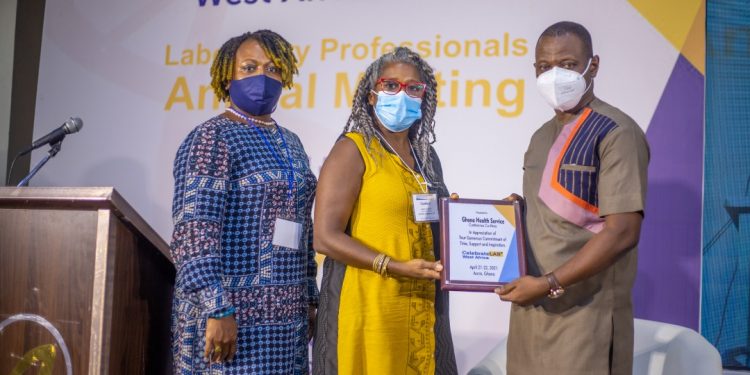The 7th CelebrateLAB West Africa Conference was held in Accra, Ghana from 21st – 22nd April 2021.
The meeting brought together 225 onsite and virtual participants from West Africa, Uganda, Zimbabwe and United States of America.
The delegates included Health Research and Medical Laboratory Scientists, Physicians, Regulators, Policy Makers,
Innovators and Vendors. Representatives of world and regional bodies such as World Health Organization (WHO), Africa Centers for Disease Control and Prevention (CDC) and Africa Society for Laboratory Medicine (ASLM), participated in the conference and shared their expertise and perspectives.
The conference was organized in partnership with the Ghana Association of Medical Laboratory Scientists (GAMLS), and co-hosted by the Ghana Health Service (GHS) and Akai House Clinic.
The following are the outcome of the 2-day deliberations on the theme: “Combating Emerging and Reemerging Infections through Standardization of Laboratory Practice across West Africa.”
Disease Surveillance and Global Health Security
1. The Conference affirmed diagnosis as the backbone of modern medicine. Therefore, substandard laboratory capacity is a challenge to Global Health Security (GHS) and greatly undermines capability of the subregion to prevent, predict and fight pandemics. Properly structured national laboratory systems ensure improved surveillance systems that help to quickly detect outbreaks, monitor and implement interventions. The Conference further affirmed that laboratory surveillance helps in early detection of diseases, timely intervention and evidence-based policy decisions.
2. The Conference noted that the Covid-19 pandemic has further exposed the existing gaps in the laboratory systems across the West Africa region and compounded Africa’s disease burden, which includes Malaria, HIV, TB and Lassa fever. The crisis revealed countries’ lack of adequate preparedness to pandemics, non-compliance with
international best practices and ill suited medical research. The Conference further noted that access to vaccines and treatment is crucial to Global Health Security.
3. The Conference concluded that the continuous occurrence of infection outbreaks indicates the importance of reducing collective and individual vulnerability to infectious diseases threats.
4. The Conference delegates identified a number of factors impacting EPI (Expanded Programme on Immunization) Surveillance, including: lack of laboratory infrastructure, limited capacity to identify AMR (Antimicrobial resistance) pathogens, lack of robust gene sequencing facilities and standardization issues
across laboratories in the subregion.
5. The Conference stressed the urgent need to enhance disease surveillance, epidemic prevention and laboratory
system capacity in readiness for emerging and re-emerging infections. Delegates agreed that a comprehensive and effective monitoring system for surveillance of infectious diseases is needed to ensure early detection and timely intervention.
6. The Conference called for increased investment in EPI surveillance, national laboratory system strengthening and human resource capacity building in epidemiology, and intensification of immunization. The Conference
proposed a regional and national investment of about 5% of GDP in surveillance systems and pandemic
preparedness.
7. The Conference emphasized that investments in laboratories and disease surveillance networks are essential
elements of national public health responses to outbreaks. They stressed that functioning clinical laboratory
network that is fast, safe, accurate, connected, is vital component of Global Health Security. In this regard,
laboratory systems at all levels across the region need to be strengthened to better detect infectious diseases and to improve health outcomes.
8. The conference recognized the key roles Biomedical Laboratory Scientists (BMS) play in AMR and detection of
zoonotic diseases, to curtail the spread of dangerous pathogens. The Conference delegates stressed the need to
enhance the capacity of laboratory practitioners, by investing in training and re-training of professionals,
especially at specialist levels to help strengthen laboratory systems across the subregion.
Policy Actions
9. The Conference called on sub-regional governments to urgently review key national laboratory policies to balance Covid-19 response. We believe that proper planning and implementation of key national laboratory policies coupled with appropriate quality management systems and leadership are keys to stronger laboratory systems.
We call for the development and implementation of policy on quality and competence in health laboratories, and the involvement of laboratory professionals in policies pertaining to laboratory operations.
10. The Conference was of the strong view that the existing system of testing, monitoring, and evaluation needed to be improved. Integrated surveillance of COVID-19, Ebola, Lassa, Typhoid and other infections needs to be
established. In this regard, the Conference delegates encouraged the development of one multiplex testing. They
also called for the implementation of effective and government-funded immunization systems.
11. The Conference also proposed the development of a waste management programme that involves segregation, for implementation at all laboratory levels, and training of laboratory personnel and cleaners in waste management, to prevent the spread of infectious diseases.
12. The Conference bemoaned the grave lack of research capacity in Africa, especially in the area of sequencing, and stressed the need for urgent attention through deliberate policies. We propose regional collaboration in
surveillance that involves systematic and robust genomic testing, for the identification of infectious pathogens.
13. The Conference called on governments in the subregion to commit resources into research, especially in the
medical field. We stressed the need for collaboration in research among African countries. We believe that African
governments must take decisions based on local research, and not just copy the western countries.
Laboratory Accreditation
11. Delegates affirmed that a good number of laboratories in the subregion are ready for accreditation and have taken steps to ensure they achieve accreditation, but they face major constraints, including lack of support from their institutional/facility managers, unavailability of accreditation bodies in the West Africa region, the unwillingness to commit resources in the training of persons to assist with the accreditation and the lack of councils or regulatory bodies that are solely responsible for the Medical Laboratories in the subregion.
12. The Conference delegates encouraged continued advocacy for more accredited laboratories in West Africa and urged governments in the subregion to prioritize accreditation of clinical, research and public health laboratories as a matter of urgency.
13. They also called for the setting up of sub-regional regulatory body that is focused on health laboratory. Creating Value Chain and Product Development in West Africa
14. The Conference noted that the recent pandemic has further highlighted the urgent need to work towards sub-regional self-sufficiency in health laboratories, and stressed the need to build capacity through public-private
partnership to produce reagents and test kits for diagnosis in West Africa.
15. The Conference identified financing as a major barrier to sustaining the value chain in the health laboratory sector in the subregion and affirmed that creating and sustaining value chain helps to create efficiency and effectiveness in the healthcare laboratory to ensure quality.
16. The Conference further noted that local innovators and businesses in the sector face a number of obstacles
including competition from government and government agencies, unstable currency, taxes and import duties, and regulatory demands and cumbersome processes – which seems to be stricter for local businesses and startups than foreign ones.
17. The Conference called on governments in the subregion to re-prioritize and increase budgetary allocations for healthcare, science and technology. Governments must support local innovations & manufacturing of laboratory equipment, materials, test kits and reagents. Countries need to support growth stage of startups through tax waivers and other assistance that makes the environment conducive for business to thrive.
18. The Conference also encouraged regulatory bodies to work with startups to expedite regulatory requirements to encourage local production.
19. The Conference proposed that regional bodies such as Economic Community of West Africa States (ECOWAS),
West Africa Health Organization (WAHO), Africa Union (AU) and Africa CDC should be brought on board to
help develop a harmonized system that enables local innovation and production.
20. Ghana was chosen again to host the 2022 conference. Conference Ambassadors, who shape the structure and
content of CelebrateLAB® West Africa, cited the enormous support received from the hosting partners, especially
the Ghana Health Service, and ease of travel to and from Ghana during the Covid-19 pandemic period as some of
the main reasons for voting Ghana.










